#education grammar
Explore tagged Tumblr posts
Text


Bruce Springsteen performing in Barcelona during The River tour, 1981. Photos by Francesc Fàbregas.
#bruce springsteen#bruceposting#Francesc Fàbregas#80s#q#grammar folks is it “performing ”during“” or “on” the tour? my ESL education is failing me
71 notes
·
View notes
Text

Some tips to study!:🎀
1.Set Clear Goals: Break your larger objectives into smaller, specific tasks for each study session. This makes your progress more manageable and keeps you motivated.
2.Create a Study Schedule: Plan your study time in advance and stick to a routine. This helps develop discipline and ensures you cover all the topics you need.
3.Use Active Learning: Instead of just reading or highlighting, actively engage with the material. Try summarizing what you learn, ask yourself questions, or teach the topic to someone else.
4.Take Regular Breaks: Study in short bursts, like 25-30 minutes, followed by a 5-minute break. This method, known as the Pomodoro Technique, helps keep your mind fresh and focused.
5.Stay Organized: Keep your notes, books, and digital files organized. Having a clean and structured workspace helps you focus better and saves time during study sessions.
6.Use Multiple Resources: Don’t rely on one textbook or resource. Combine materials like videos, online courses, or apps to enhance your understanding of the subject.
7.Review Regularly: Revisit your notes frequently. Regular review helps move information from short-term to long-term memory, making it easier to recall during exams.
8.Practice Past Exams or Problems: If possible, work on past exam papers or similar problems. This prepares you for the format and helps identify areas that need more attention.
These tactics can help you stay efficient, organized, and motivated during your studies.
#study blog#college life#education#school#studyblr#studying#grammar#tips#study aesthetic#study tips#study notes#student#artists on tumblr#tumblog#learning#learnsomethingneweveryday#today i learned#studyspo#studyabroad#blog#study movitation#learnlanguages#love yourself#collage#blogging#life lessons#dark akademia#study with me#girlblogging#get motivated
57 notes
·
View notes
Text

Hey gang, it’s your old pal Neo here. If you know me, it’s probably from one of the several very stupid TF2 comics I’ve posted to Tumblr.
However! I am also an English major (unfortunately). One who has read millions of words worth of fanfiction in their life. I have been part of the Sherlock, BNHA, Disco Elysium, and, of course, TF2 fandoms; I’ve been around the block.
The further I’ve progressed into my English education, the more I’ve noticed which mistakes are the most common in fanfiction. Many of them are easily fixable; writers just need to be pointed in the right direction.
“Neo! Does this mean you think people shouldn’t be allowed to post their works online without a background in formal English education?”
Of course not! I can explain why if you’d care to venture below the cut with me!
Yes, I will explain how to use commas.
It’s important to note that this is NOT a post about formal writing. You aren’t writing an essay. Please, for the love of god, do not write fiction like you’re writing an essay.
There are no stakes to writing fanfic. No one is going to get hurt if an author doesn’t know what a dangling participle is. One of my favourite things about fanfiction is that it’s one of the only art forms left that’s done exclusively for fun! You should write what you enjoy, and share what you make with like-minded people.
What I want to do is provide assistance as best I can to writers who want to improve their fundamentals without having to take the same university courses I did. Nobody is going to be getting a formal education to write fanfiction unless they’re ridiculously dedicated, and I’m not expecting that of anyone.
The point I need to stress is that knowing these grammar fundamentals can instantly improve the flow of your writing. Punctuation is a ridiculously important tool for writers, ESPECIALLY in fiction. Commas, semicolons, and full stops (including periods, exclamation points, and question marks) steer the pacing in the reader’s mind; did you notice how your brain stopped for a second after that semicolon? I can show you how to do that.
You may be wondering why I’m going through so much effort to teach all of this to strangers on the internet. The answer is that I enjoy sharing this knowledge with others and helping them grow. By seeing this, my goal is to help you become more proficient at self-editing. Showing this to people who actually want to learn will, hopefully, benefit the community as a whole, and I think that’s very worth it.
Also, while this post is obviously themed around TF2, the points I’m making can be applied to any fiction. Grammar is for everyone, and the church of the semicolon always has room for more initiates.
Also also, as an edit, I should clarify that this is meant to cover the more objective facets of self-editing, which is why I'm mostly covering punctuation. Maybe I'll do another post about using adjectives someday.
With that out of the way, let’s get going!
I’ve teamed up with several English teachers (real ones! One of which may or may not be my mom!) and an editor to gather a list of the most common problems we see in amateur fiction. This post is going to be split into three broad sections: apostrophes, commas/semicolons, and other common problems.
The apostrophe
This section is short, but it holds weight. Other than commas, apostrophes are the most typoed grammatical tool in any fanfiction I’ve edited. This is because, much like the rest of English, the rules surrounding them can be annoying and inconsistent.
Apostrophes have two main uses: possessives and conjunctions.
A possessive is a word that denotes the ownership of one thing over another. The vast majority of the time, this is done using an apostrophe and an S.

There is, however, one glaring exception to this rule, and it’s the bane of my existence.
When denoting possession of an object over something else while using the pronoun ‘it,’ you do NOT add an apostrophe before the S.
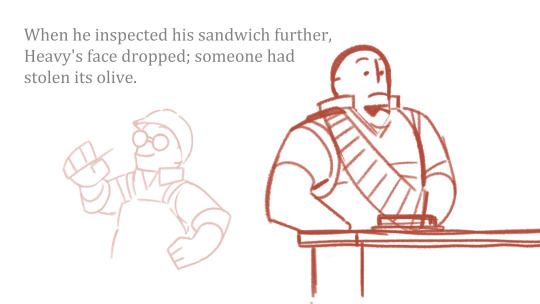
A conjunction, on the other hand, is when a writer uses an apostrophe to combine two words. The following are examples of common conjunctions:
What’s (what is)
They’re (they are)
It’s (it is)
Conjunctions are not often used in formal writing. Thankfully, we aren’t dealing in formal writing. Go crazy.
Time for a lightning round of the most commonly mistaken for each other possessives and conjunctions!
Your is possessive. You’re is a conjunction of ‘you’ and ‘are.’ When you can’t decide which one to use, imagine replacing it with ‘you are’ and seeing if it makes sense. If it doesn’t, use your.
Their is possessive. There indicates a location. They’re is a conjunction of ‘they’ and ‘are.’

The comma and the semicolon
You knew it was coming. I knew it was coming. It’s time to talk about commas.
Commas and semicolons are far and away the biggest grammatical hole in the toolset of fanfiction writers everywhere. They’re often treated like the rules surrounding them are complicated and difficult to understand, but the exact opposite is true!
The big issue I’ve heard time and time again is that the rules of commas are often explained through metaphor instead of example; this means that writers everywhere have slightly different ideas of how you’re supposed to use them. The fact of the matter is that, yes, there are correct and incorrect ways to use commas. Knowing when they’re appropriate and when they aren’t is easily the fastest way to bring your writing from looking amateurish to sounding professional and experienced.
In order to know how to use a comma, you must first understand the difference between a dependent and an independent clause.
An independent clause is a section of writing that functions perfectly well as its own sentence. It MUST have both a subject and an action/verb.
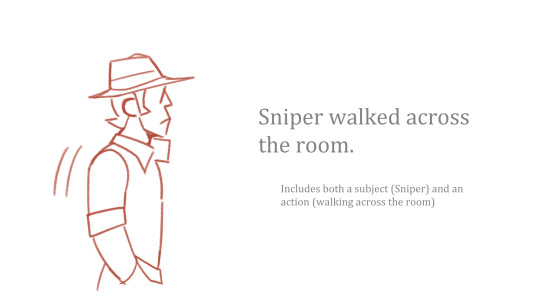
A sentence without an independent clause is known as a fragment, and they’re the bane of English teachers with highlighters everywhere.
A dependent clause is a section of writing that does not have both a subject and an action; it does not function as its own sentence.

Now, let’s say you want to combine the two. When joining a dependent clause to an independent clause, the order in which they are placed is crucial to whether you use a comma or not.
When joining a dependent to an independent with the independent clause first, you do not need to use a comma.
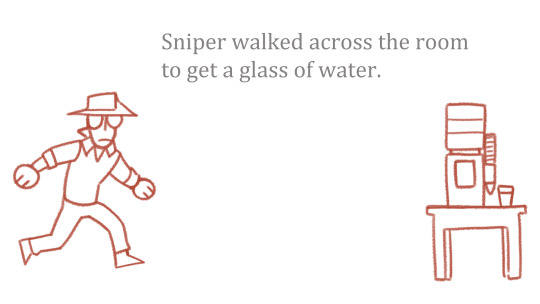
When joining a dependent to an independent with the dependent clause first, you MUST use a comma.
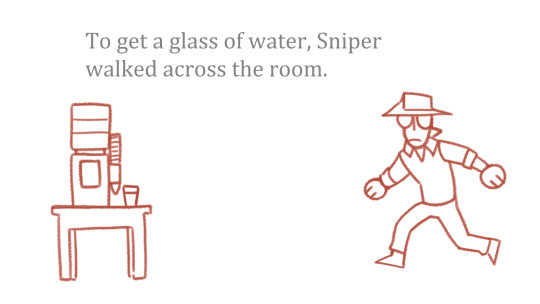
Keep in mind that, if one strives for total grammatical perfection, all narrative sentences MUST have an independent clause. This, however, does not apply to dialogue. Human beings do not think about whether what they’re saying is a dependent clause, and neither would the vast majority of fictional characters. Don’t be afraid to break the rules of grammar as long as it’s contained within quotation marks.
Alright, that’s the easy part. Time to learn about joining two independent clauses. It’s semicolon time, baby!
If you join two independent clauses without properly using a comma or a semicolon, it is a run-on sentence. You do not want these in your writing. They’re awkward to read and mess up the flow.

When joining two independent clauses, you can use EITHER a comma or a semicolon. You just need to follow these rules:
If you’re joining two independent clauses with a comma, you MUST use a joining word (and, but, so, etc.) AFTER the comma.

If you’re joining two independent clauses with a semicolon, you do NOT need to use a joining word.

Did you know that a sentence with a comma counts as its own independent clause? This means that you can make a sentence that includes a mix of both without it being a run-on! Just make sure that, no matter what, the semicolon is between two independent clauses.
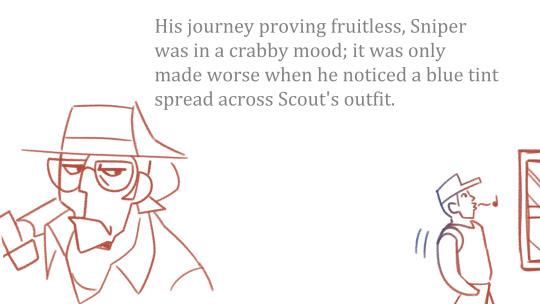
Still, try not to write more than two clauses in a sentence too often. Sentences with a lot of punctuation are very attention-grabbing, but shouldn’t be overused. Full stops aren’t your enemy and variety is the spice of life.
It’s also important to remember that you should avoid using more than one comma in a clause (with the exception of the rule below). That part loops back to the 'avoiding run-ons' bit.
It’s really that easy!
Commas are also used in informal writing to inject a separate thought or descriptor mid-sentence without breaking the flow by adding a period. This is often used when describing the perspective of a character experiencing something in a story, but not (usually) when using omniscient perspectives.
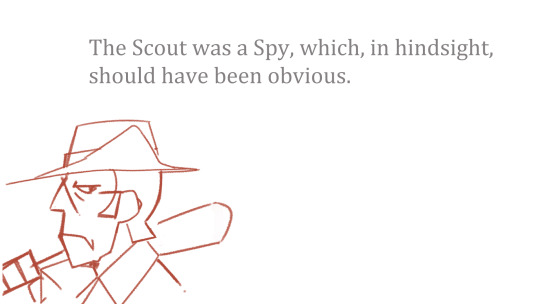
The final issue I frequently see with commas in fanfiction is in regards to dialogue. Sometimes you end it with them, and sometimes you don’t. What gives?
Well, my friend, the answer is, thankfully, much simpler than the previous section.
When following dialogue with a dialogue tag, use a comma instead of a full stop. If you’re continuing the previous sentence after the tag, use a comma after it as well.
Note that a dialogue tag is a short phrase that identifies the speaker. It isn’t a complete sentence on its own.
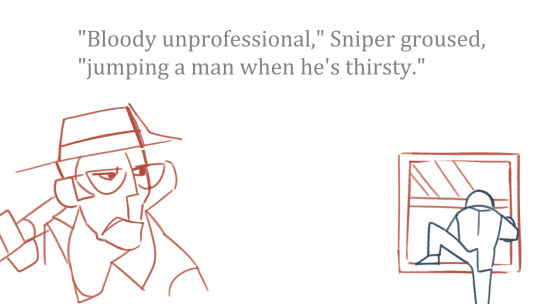
When following dialogue with an action that does not serve as a dialogue tag, use a full stop instead of a comma.
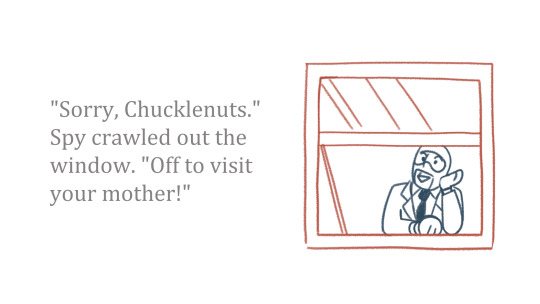
Other common problems
This section is dedicated to putting specific grammatical errors into words, along with how to solve them.
Not sticking to the chosen point of view
Always choose your point of view before you start. Is it in the first, second, or third person? Is it omniscient or limited? Does the point of view switch during the story?
First person perspective is told as if the POV character is directly describing their experience to the reader. The character uses I and we to describe their own actions.
Second person perspective is told as if the reader is a character in the story and their actions are being described to them. This is the rarest, and the most difficult to write.
Third person perspective is the most common and the simplest to write. The events of the story are a separate entity from the reader altogether and the narrator uses they/he/she/it pronouns for characters.
Omniscient perspective means the narrator of the story knows all, including the thoughts and feelings of each character.
Limited perspective means the narrator of the story only knows what the POV character knows.
Past and present tense
When you decide between writing a story in past or present tense, it is crucial that you do not switch between them unless it is narratively intentional. Reading a past tense story that mistakenly switches to the present tense is like being pulled out of the room someone is telling a story in and suddenly taking part in it yourself. It’s disorienting and gives the reader unwanted pause.
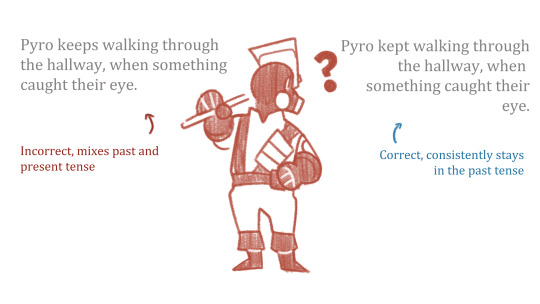
Overly-long paragraphs
A common adage spread by English teachers is that most paragraphs should be at least eight sentences long. This is great advice for beginner essays. You’re writing fiction.
If you have a new thought, start a new paragraph! A concise and well-read single-sentence paragraph is infinitely better than one that drags a thought for too long. Aim to have a blend of paragraph lengths when you write, alternating between the descriptive and the punctual.
Dangling participles
A dangling participle is when a word is used to describe a noun that isn’t actually present in the sentence. Much like how a sentence without an action isn’t grammatically correct, neither is a sentence without a subject.
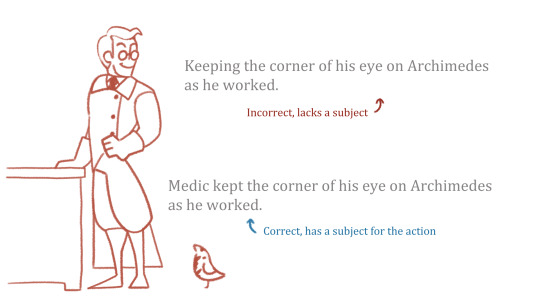
Malapropisms
A malapropism is when an author mistakenly uses one word or phrase instead of another similar-sounding one. I’m not about to list every single malapropism ever made, but these are the ones I notice most often:
To comprehend is to understand something, to apprehend is to arrest someone, and to be apprehensive is to be anxious or fearful of something bad happening.
Could care less means you do care. Couldn’t care less means you don’t.
A lot means a large amount of something. Alot isn’t a word and you shouldn’t use it.
The only real solution to using malapropisms is to make sure you fully understand any words you use in your writing. Never guess, and make sure you always google it. Having beta readers also helps.
If you made it this far, congratulations! You now know the most common errors in amateur fiction and how to solve them! Thank you for listening to me complain for two thousand words.
The most important thing to remember is that it’s okay to make mistakes. First drafts are always gonna be a little bad. The real key to success is knowing what your end goal is, and how you plan on achieving it. Here’s hoping this was a helpful tool for that!
Shoutout to @salmonandsoup for helping me think of the list of issues to address! You're a real one. Also shoutout to my mom, who doesn't have Tumblr. Also the third person. You know who you are.
#grammarposting#tf2#grammar#educational shitpost#writing#fanfic#fanfiction#writing advice#fanfiction writing advice#team fortress 2#tf2 fanfiction#bro your participle is dangling
245 notes
·
View notes
Text
A Few Fun Little Language Learning Tips
Hello, these are a few little tips I've found on my language learning odyssey that you may find fun or helpful
Accents! This can be a great way to 'warm up' before speaking more in depth, or a training exercise, but a fun way I've found to get myself to make French sounds (it works for any language really) is to speak English (or insert native language here) with an exaggerated accent that comes from someone speaking your target language, I find this a fun way to get the sounds of a language you're trying to speak into your head in order to make speaking easier (great for speaking exam practice)
Use addictive social media for profit! So this would be best for intermediate to advanced learners, but a way to learn more slang, grow your vocabulary, and just generally get more language input in an easy way is to create a dedicated social media account in your TL and simply lurk, do you spend hours doom scrolling short form video content? Do it guilt free by doing it in your TL, do you like cat memes? read them in your TL, it's addictive, and low energy, so you can do it even when your brain feels like a fried egg
Need a pen pal? Try Ai! So, speaking to real people in your TL can be a daunting task, for reasons ranging from the fear of saying something wrong to just plain stranger danger, so a safer (and totally free) alternative can be through ai chat bots, you can do this with dedicated language learning bots or with just plain old ChatGPT
Nostalgia Bait! One of the most beautiful things about visual art is the fact that it is a universal language in itself, certain symbols can hold significance wherever you go, so re-watching animated TV shows from your childhood or watching new TV content made for kids in your TL can be a great way to add to your vocabulary, and in call & response shows, generate responses and make them more complex if you like, to add more intrigue
When in doubt, write it out! I personally struggle a lot with conjugation, so if you do to, here's a solution I found, use Quizlet learn to help drill conjugation, and when your free rounds run out, you can manually use the flash cards to use the same effective learning strategy (or pay for Quizlet plus, but I, personally would rather eat a dusty lamp then pay for something that, in my opinion, should be free to all learners)
#language#language learning#tips#grammar#langblr#french language#learning#education#language acquisition#language study#language stuff
380 notes
·
View notes
Text
if any other group of people other than white middle class parents were homeschooling en masse like IBP/Rodrigues type Christians, i can't help but feel people would be more mad about it.
like imagine if there was a movement for gay parents to take their kids out of school, isolate them from every aspect of society, and only teach them things written by Trixie Mattel (the gay equivalent to a pastor in my head). people would lose their shit and call it brainwashing and abuse and demand the government make more regulations to the education requirements.
but because they're white and straight and it's about Jesus, it's their "preference" and people are totally ok with 15 kids being so uneducated they can't write a cohesive sentence in their 20s.
#learning issues aside there isn't one rod kids who uses proper spelling and grammar#and I'm not talking about parents who aren't in cults and actually make an effort to educate their kids/ give them more experiences while#homeschooling ok just to state the obvious#the rodrigues family
22 notes
·
View notes
Note
WAIT metal sonic...they don't love you like I love you
He signs: NOBODY LOVE YOU LIKE I DO K-N-I-Z-U-U
#ask#ask blog#sonic#send asks#sonic fandom#sth#sonic the hedgehog#metal sonic#asl#huge thanks to pandora for educating me on ASL grammar
23 notes
·
View notes
Note
For a while I thought BAMF as a tag stood for “Bad at my feelings”, s only after I actually clicked on it that I realised it means Badass mf 😭😭
still living up to my name cough cough
living it up to it like it's a wholeass competition
#how even#how did you even read it before#zhongli is a Bad At My Feelings??????????????#are you the same kind of people that write smh my head or some bs like that#like accronyms usually still work with grammar haps i hope you know that#anyway#can't relate i always look up stuff just to make sure shit like this doesn't happen to me#i need to remind myself that there's an entire new online generation that Doesn't Do That#like you're probably in school i shouldn't be this mean (?) to you lmao#so uh congrats on getting educated haps baby steps <3
19 notes
·
View notes
Text
To every teacher who ever said, "I don't know, CAN you?" when a child asked you "Can I go to the bathroom?"
Fuck you.
From the bottom of my grammar-loving heart.
Fuck you.
You could have actually taken the time to teach the kids in your class the difference between "Can" and "May" and instead decided it was better to repeatedly ask CHILDREN "I don't know, CAN YOU?" like it was an easy answer for them.
I once spent at least two minutes at a teacher's desk because I said, "Can I go to the bathroom?"
And she said, "I don't know? CAN YOU?" Clearly amused, but I was fucking NINE and also, you know, had to PEE, and I had NO IDEA what was going on because I WAS NINE.
So, I said, "Yes???"
And she said, "Are you sure?"
And, being utterly without understanding, I fell back on what I needed: an answer for going to the bathroom.
"Can I go to the bathroom?"
"I don't know, CAN YOU?"
This repeated a couple more times because I DIDN'T KNOW WHAT I'D DONE WRONG. I'd been taught that you asked the teacher to go to the bathroom, and the teacher either said yes or no.
The teacher turning into some sort of fucking challenge was NOT helpful and made me feel 1) very uncomfortable, 2) very embarrassed, and 3) like I was about to pee my damn pants (I had an issue in childhood where I couldn't tell I needed to go to the bathroom until I absolutely had to go. My teachers were aware of this.)
I finally got a yes, with the teacher acting like I'd failed a quiz.
I think it was my mom who had to explain what the fuck had happened. That "may" is how you ask permission "properly."
I remind you, one last time, I was NINE.
And, like, if you're so up your own ass you're gonna be a dick to a nine-year-old trying not to pee themself. Maybe teach the can vs. may thing on the first day and give every kid who asks for the bathroom "properly" a peppermint or something to encourage remembering.
Don't just harass a child for fuck's sake.
#education#grammar shit#this just came back to me like a nightmare i'd forgotten#i was also going through severe family shit#which the teacher was also very aware of#but why show a bit of kindness#when you can harass a small child
114 notes
·
View notes
Text
My unpopular opinion of the day is that grammar correcting AI isn't inherently bad.
Like, specifically AI (or just... Machine learning systems) that help you with spelling of certain words and punctuation and grammar structures? They're not bad. Actually, they're extremely useful and can be considered an aid to many people, such as:
- dyslexic people
- English as Second Language people
- people with fine motor issues
- more
As well as being generally just useful to all of us. Sure, there are drawbacks such as students using them to cheat on leaning the grammar/spelling, but 1) cheating spelling has been a thing since the online dictionaries became a thing and banning them won't solve the issue 2) AI-checking grammar and spelling in essays or formal papers isn't an issue because they're barely graded on those things anyway, and frankly they shouldn't be.
The real issue with those AIs is that most of the information in their data banks 1) is obtained without consent, illegally and/or by scrapping 2) isn't double-checked by a real human being. Which makes its usage dubious at best and actually pretty dangerous at worst.
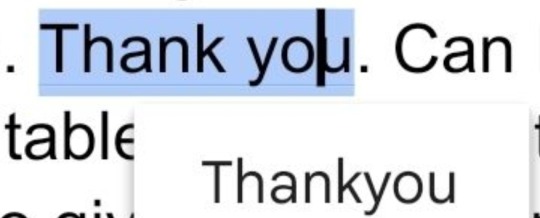
This little blunder google documents did to my writing in the example above is most likely the result of the following:
1) Some people writing thankyou and getting a pop up correction for "thank you"
2) Those people, for whatever reason may be, chose to keep their original spelling
3) This probably happened enough times that now Google AI most likely considers "thankyou" to be an alternative spelling of "thank you" that it wasn't aware of previously instead of a mistake
4) Because it's a system that lacks context and awareness, it will occasionally offer incorrect spelling over a correct one because it considers them mutually possible. It will also not flag an incorrect spelling, unless some other data overrides the rule.
This happened so many times for so many people that now Google Doc's corrections are considered unreliable even for common words, which would not have fucking happened if Google didn't train their AI on their users documents.
But ethically trained on the input of consenting users that is also double-checked by real people to not contain any intentional misleading AI can still exist and would be a very good tool to have. Alas...
#jay rambles about life.txt#sigh#saw the article that says that some educational facilities now flag ais that correct grammar mistakes as#the same as a student using generative ai and#it's. really not the same thing. at all
31 notes
·
View notes
Text
Basic vs advanced English sentences
1. I'm very tired. - I'm drained.
2. It's very hot outside. - It's scorching outside.
3. He's very angry. - He's furious.
4. It's very noisy. - It's deafening.
5. I'm very surprised. - I'm astonished.
6. It's very bad. - It's atrocious.
7. I'm very busy. - I'm up to my ears.
8. It's very good. - It's excellent.
9. She's very beautiful. - She's stunning.
10. I'm very scared. - I'm terrified.
11. It's very important. - It's crucial.
12. It's very strange. - It's bizarre.
13. He's very funny. - He's hilarious.
14. It's very dangerous. - It's perilous.
15. I'm very hungry. - I'm famished.
16. It's very simple. - It's straightforward.
17. He's very lazy. - He's indolent.
18. I'm very happy. - I'm elated.
19. It's very clean. - It's spotless.
20. It's very dirty. - It's filthy.
21. I'm very sure. - I'm positive.
22. It's very small. - It's tiny.
23. It's very big. - It's enormous.
24. He's very smart. - He's brilliant.
25. It's very cheap. - It's dirt cheap.
26. It's very expensive. - It's exorbitant.
27. It's very cold. - It's icy.
28. It's very wet. - It's drenched.
29. It's very dry. - It's parched.
30. It's very fast. - It's rapid.
31. It's very slow. - It's sluggish.
32. He's very strong. - He's powerful.
33. She's very weak. - She's frail.
34. I'm very nervous. - I'm anxious.
35. It's very boring. - It's dull.
36. It's very exciting. - It's thrilling.
37. It's very interesting. - It's captivating.
38. It's very rare. - It's scarce.
39. It's very common. - It's widespread.
40. I'm very thirsty. - I'm parched.
41. It's very old. - It's ancient.
42. It's very new. - It's brand new.
43. He's very young. - He's youthful.
44. She's very old. - She's elderly.
45. It's very light. - It's weightless.
46. It's very heavy. - It's hefty.
47. It's very quiet. - It's silent.
48. It's very loud. - It's thunderous.
49. It's very bright. - It's dazzling.
50. It's very dark. - It's pitch black.
51. It's very easy. - It's effortless.
52. It's very hard. - It's arduous.
53. It's very clear. - It's crystal clear.
54. It's very dirty. - It's grimy.
55. I'm very confused. - I'm baffled.
56. It's very sad. - It's heartbreaking.
57. It's very happy. - It's jubilant.
58. It's very windy. - It's gusty.
59. It's very dry. - It's arid.
60. It's very wet. - It's saturated.
61. It's very cloudy. - It's overcast.
62. It's very stormy. - It's tempestuous.
63. It's very quiet. - It's hushed.
64. It's very loud. - It's ear-splitting.
65. It's very quick. - It's lightning fast.
66. It's very slow. - It's lethargic.
67. It's very high. - It's towering.
68. It's very low. - It's depressed.
69. It's very far. - It's distant.
70. It's very near. - It's adjacent.
71. It's very polite. - It's courteous.
72. It's very rude. - It's insolent.
73. It's very expensive. - It's exorbitant.
74. It's very cheap. - It's inexpensive.
75. It's very thick. - It's dense.
76. It's very thin. - It's slender.
77. It's very weak. - It's fragile.
78. It's very strong. - It's robust.
79. It's very hard. - It's solid.
80. It's very soft. - It's tender.
81. It's very fat. - It's obese.
82. It's very skinny. - It's emaciated.
83. It's very cold. - It's frosty.
84. It's very hot. - It's boiling.
85. It's very rough. - It's coarse.
86. It's very smooth. - It's silky.
87. It's very shiny. - It's gleaming.
88. It's very dull. - It's lackluster.
89. It's very small. - It's minuscule.
90. It's very big. - It's colossal.
91. It's very rich. - It's affluent.
92. It's very poor. - It's destitute.
93. It's very important. - It's paramount.
94. It's very unimportant. - It's trivial.
95. It's very strong. - It's mighty.
96. It's very weak. - It's feeble.
97. It's very tasty. - It's delicious.
98. It's very untasty. - It's bland.
99. It's very cheerful. - It's exuberant.
100. It's very quiet. - It's tranquil.
48 notes
·
View notes
Text

Lower Elementary - Collaborative Learning: Grammar Boxes
The tactile nature of the Grammar Boxes engages students physically, making abstract grammar concepts more concrete and understandable. The color-coded cards and symbols, with nouns printed on black rectangles and represented by black triangles, provide visual cues that help students easily identify and differentiate nouns from other parts of speech. These students are working collaboratively in a small group, where they can discuss and explore the material together. They are using dictionaries to look up unfamiliar words, enhancing their vocabulary and comprehension and fostering a deeper understanding of the nouns they encounter. This group dynamic encourages peer learning and support, making the learning process more interactive and engaging.
#collaboration#grammar#language#vocabulary#comprehension#peer support#intrinsic motivation#critical thinker#creative thinker#problem solver#tma#montessori#private school#arlingtontx#arlington#texas#infant#nido#toddler#early childhood#preschool#kindergarten#elementary#education#nontraditional#the montessor academy of arlington
9 notes
·
View notes
Text
The Philosophy of Natural Language
The philosophy of natural language is a branch of philosophy that explores the nature, origins, and use of language as it is naturally spoken and understood by human beings. It involves the study of how language functions in communication, the relationship between language and thought, the structure and meaning of linguistic expressions, and the role of context in understanding meaning. This field intersects with linguistics, cognitive science, logic, and semiotics, aiming to understand both the abstract properties of language and its practical use in everyday life.
Key Concepts in the Philosophy of Natural Language:
Meaning and Reference:
Semantics: One of the central concerns of the philosophy of natural language is the study of meaning, known as semantics. Philosophers explore how words and sentences convey meaning, how meaning is structured, and how language relates to the world.
Reference: Reference is the relationship between linguistic expressions and the objects or entities they refer to in the world. Philosophers like Saul Kripke and Hilary Putnam have contributed to understanding how names, descriptions, and other expressions refer to things in the world.
Pragmatics:
Context and Meaning: Pragmatics deals with how context influences the interpretation of language. It examines how speakers use language in different contexts and how listeners infer meaning based on context, intentions, and social norms.
Speech Acts: Philosophers such as J.L. Austin and John Searle have explored how utterances can do more than convey information—they can perform actions, such as making promises, giving orders, or asking questions.
Syntax and Grammar:
Structure of Language: Syntax is the study of the rules and principles that govern the structure of sentences in natural languages. Philosophers and linguists investigate how words are combined to form meaningful sentences and how these structures relate to meaning.
Universal Grammar: The concept of universal grammar, proposed by Noam Chomsky, suggests that the ability to acquire language is innate to humans and that there are underlying grammatical principles common to all languages.
Language and Thought:
Linguistic Relativity: The Sapir-Whorf Hypothesis suggests that the structure of a language influences how its speakers perceive and think about the world. Philosophers debate the extent to which language shapes thought and whether different languages lead to different cognitive processes.
Conceptual Frameworks: Language is often seen as providing the conceptual framework through which we interpret the world. Philosophers examine how language structures our understanding of reality and whether it limits or expands our cognitive abilities.
Philosophy of Meaning:
Theories of Meaning: Various theories of meaning have been proposed in the philosophy of language, including:
Descriptivist Theories: These suggest that the meaning of a word or phrase is equivalent to a description associated with it.
Causal Theories: These argue that meaning is determined by a causal relationship between words and the things they refer to.
Use Theories: Inspired by Ludwig Wittgenstein, these theories claim that the meaning of a word is determined by its use in the language.
Language and Reality:
Metaphysical Implications: Philosophers explore how language relates to reality, including how linguistic structures might reflect or distort our understanding of the world. This involves questions about whether language mirrors reality or if it plays a role in constructing our experience of reality.
Ontology of Language: This concerns the nature of the entities that linguistic expressions refer to, such as whether abstract objects (like numbers or properties) exist independently of language.
Communication and Interpretation:
Hermeneutics: Hermeneutics is the study of interpretation, particularly of texts. Philosophers in this tradition, such as Hans-Georg Gadamer and Paul Ricoeur, explore how understanding is achieved in communication and how meaning is negotiated between speakers and listeners.
Ambiguity and Vagueness: Natural language often contains ambiguity and vagueness, where words or sentences can have multiple interpretations. Philosophers study how these features affect communication and understanding.
Language and Social Interaction:
Language as a Social Phenomenon: Language is inherently social, and its use is governed by social norms and conventions. Philosophers study how language functions in social contexts, how power dynamics influence language, and how language can both reflect and shape social structures.
Language Games: Wittgenstein introduced the concept of "language games" to describe how the meaning of words is tied to their use in specific forms of life or social practices. This concept emphasizes the diversity of language use and the idea that meaning is context-dependent.
Evolution of Language:
Origins of Language: Philosophers and cognitive scientists explore how language evolved in humans, the relationship between language and other forms of communication in animals, and the cognitive capacities required for language.
Language Change: Natural languages are dynamic and constantly evolving. Philosophers study how languages change over time and what this reveals about the nature of meaning and communication.
Critique of Language:
Deconstruction: Philosophers like Jacques Derrida have critiqued traditional notions of language and meaning, arguing that language is inherently unstable and that meaning is always deferred, never fully present or fixed.
Critical Theory: In the tradition of critical theory, philosophers analyze how language can perpetuate power structures, ideologies, and social inequalities, and how it can be used to resist and challenge these forces.
The philosophy of natural language offers a rich and complex exploration of how language functions, how it relates to thought and reality, and how it shapes human interaction and understanding. By examining the nature of meaning, reference, context, and the social dimensions of language, philosophers aim to uncover the fundamental principles that govern linguistic communication and the role of language in human life.
#philosophy#epistemology#knowledge#learning#education#chatgpt#ontology#metaphysics#psychology#Natural Language#Semantics#Pragmatics#Syntax#Linguistic Relativity#Reference and Meaning#Speech Acts#Universal Grammar#Language and Thought#Hermeneutics#Language Games#Wittgenstein#Sapir-Whorf Hypothesis#Language Evolution#Language and Reality#Ambiguity in Language#Deconstruction#Critical Theory of Language#Conceptual Frameworks#philosophy of language#linguistics
18 notes
·
View notes
Text


How to Learn a New Language: Simple Tips for Success
Learning a new language can be both fun and challenging. It opens doors to new cultures, experiences, and even career opportunities. If you’re ready to take on this journey, here are some quick tips to help you succeed.
1. Set Clear Goals
Decide why you want to learn the language—whether for travel, work, or personal growth. Having a clear goal will keep you motivated and on track.
2. Immerse Yourself
Surround yourself with the language. Watch movies, listen to music, and read in the language as much as you can. This exposure will help you absorb vocabulary and sentence structures naturally.
3. Practice Speaking Early
Start speaking the language from the very beginning, even if it’s just a few words. Practice with native speakers or use language-learning apps that focus on conversation.
4. Be Consistent
Consistency is key. Study a little every day instead of cramming all at once. Daily practice helps keep the language fresh in your mind.
5. Embrace Mistakes
Don’t be afraid to make mistakes—they’re part of learning. The more you practice, the better you’ll get, so stay positive and persistent.
6. Use Multiple Resources
Try different tools like apps, flashcards, podcasts, and grammar books. Mixing resources keeps learning interesting and well-rounded.
Conclusion
Language learning takes time and effort, but by setting clear goals, practicing daily, and embracing mistakes, you’ll improve steadily. Enjoy the process, and soon, you’ll be able to communicate confidently in a new language!
#college life#school#grammar#language#studying#studyblr#education#blog#english#duolingo#study blog#study motivation#how to do this#aesthetic#that girl#to do#study movitation#student#study aesthetic#student life#dark aesthetic#today i learned#learning#learnsomethingneweveryday#girl blogger#study tips#studyspo#study notes#discover#dark academia
39 notes
·
View notes
Text

#Tell me this isn't a romantic phrase#Educated wish#Is my new phrase#deadpool and wolverine#Ignore that the grammar is meant to be “an” I can't be bothered to change it even though it bothers me
14 notes
·
View notes
Text

Requested by anon
#Schoolhouse Rock Grammar Rock#Schoolhouse Rock#video games#gaming#video game polls#polls#tumblr polls#educational
10 notes
·
View notes
Text
PSA “mortified” is not another word for “terrified”
It is however a synonym for “embarrassed”
that is all have a good night
#got sick of people misusing the word#allow me to educate you#grammar police here except it’s actually the human thesaurus#psa#this has been a text post#spread the word#reblog to save a life#seriously this is ridiculous#english#grammar#writing#speaking#words#words words words
8 notes
·
View notes